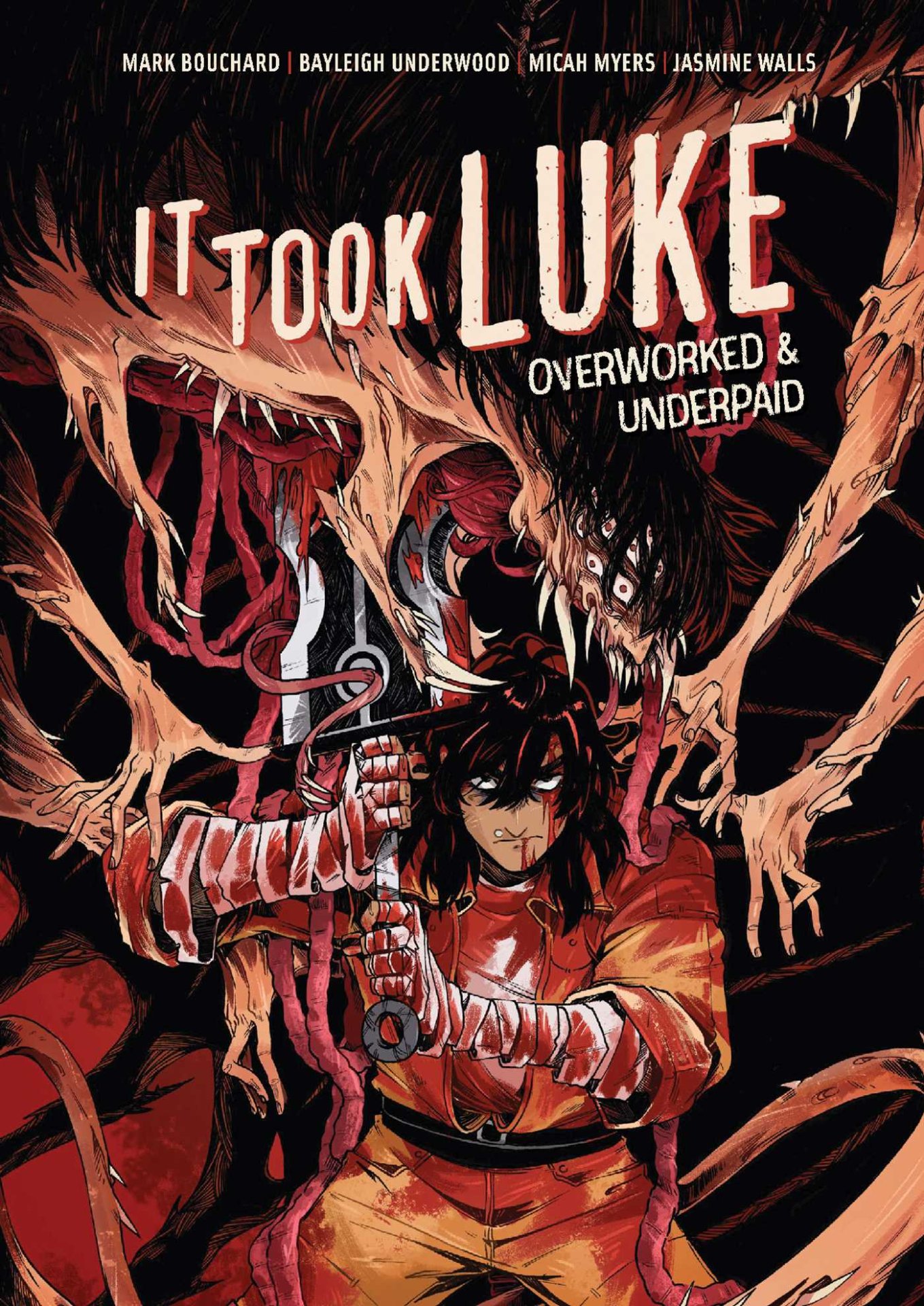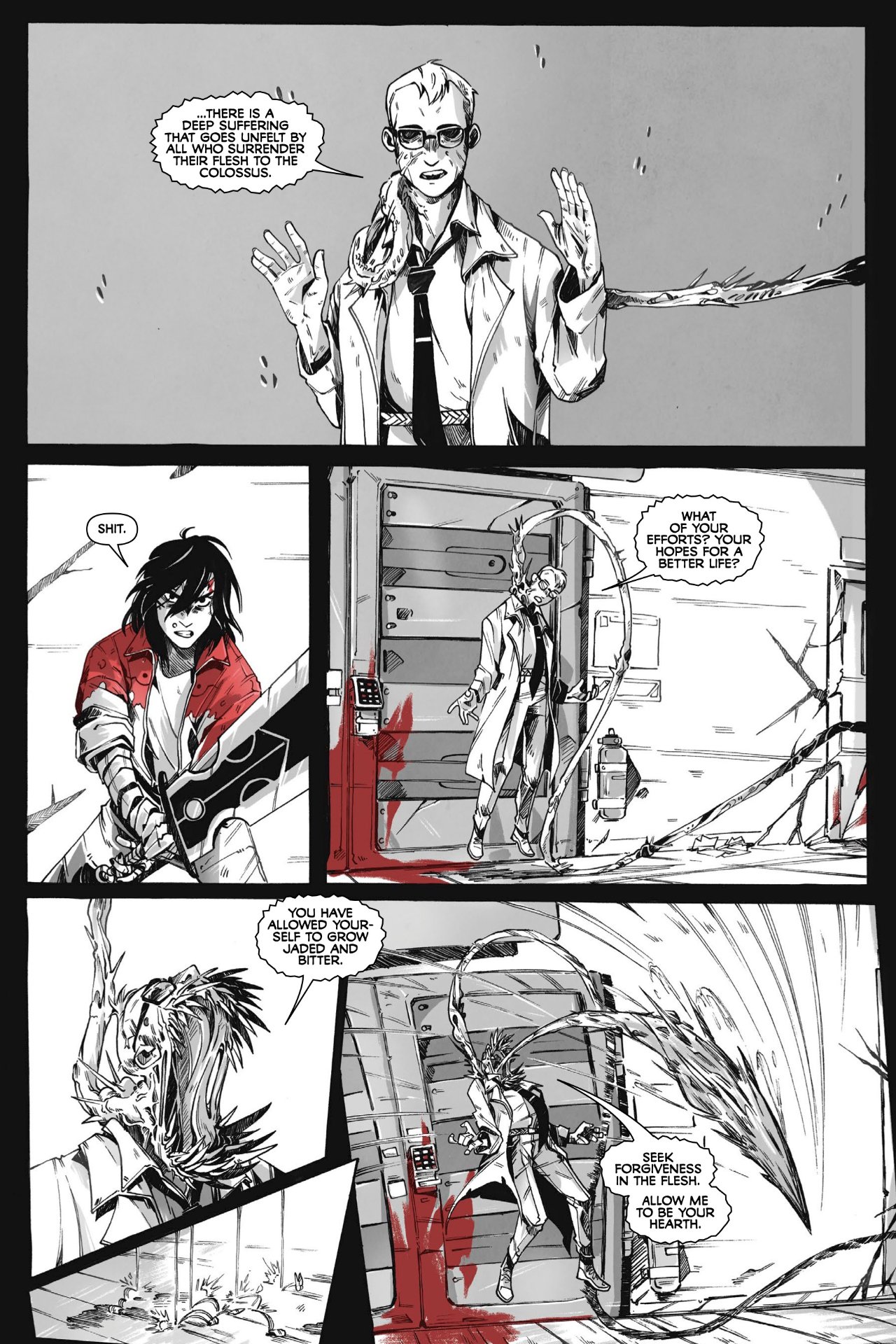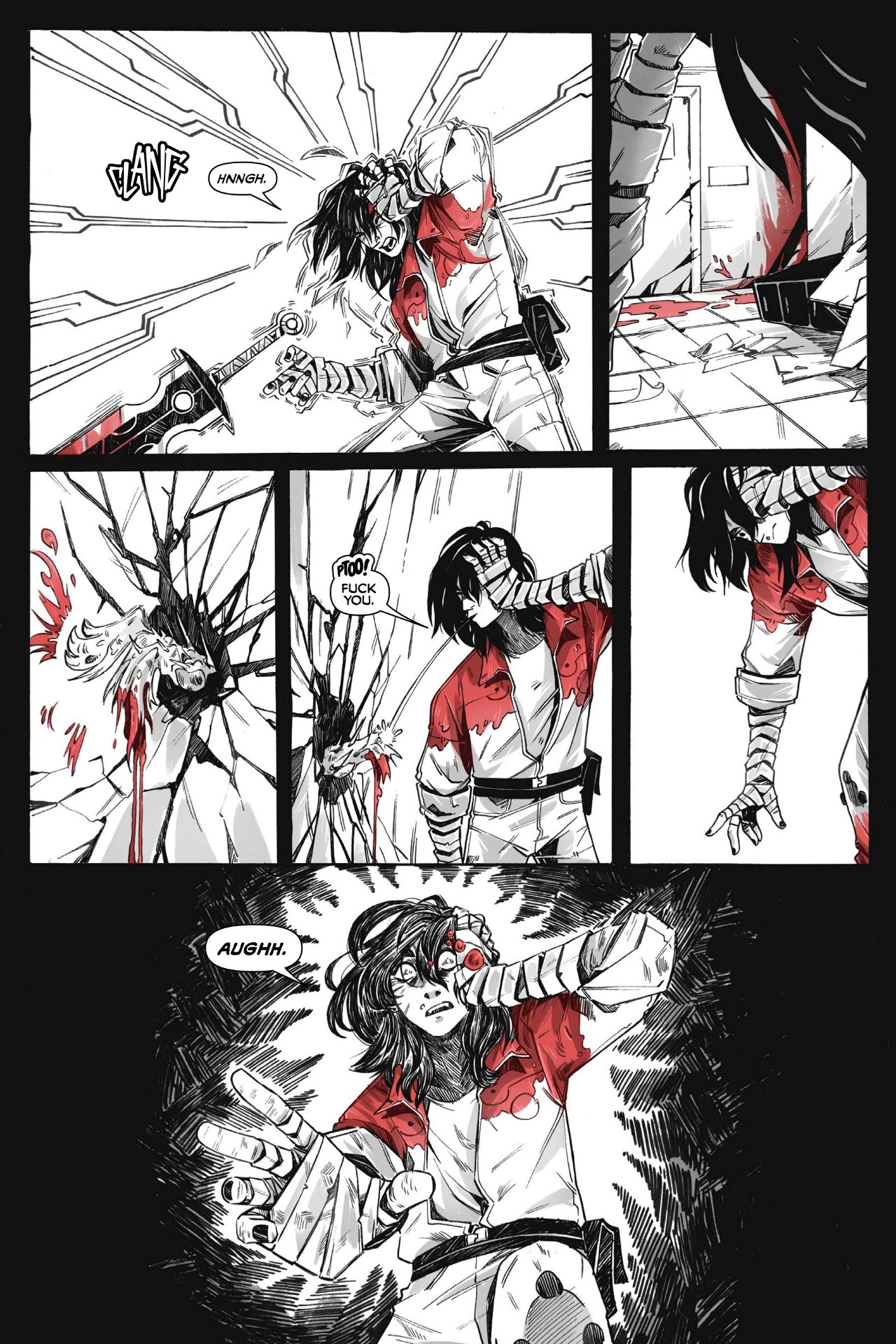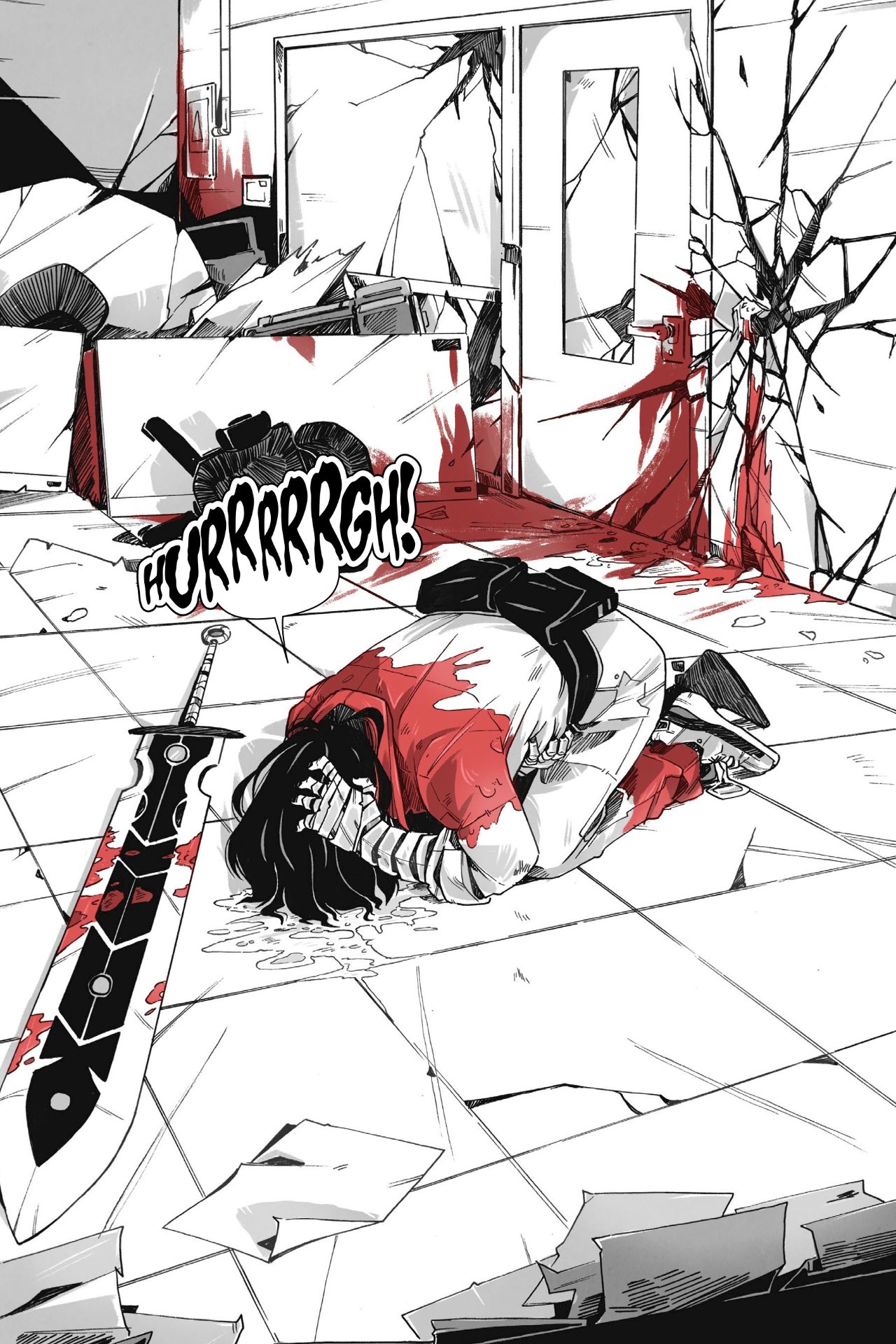Capitalism is the true monster in It Took Luke: Overworked and Underpaid
It Took Luke: Overworked and Underpaid co-creators Mark Bouchard and Bayleigh Underwood explain the book's themes and importance in the horror genre
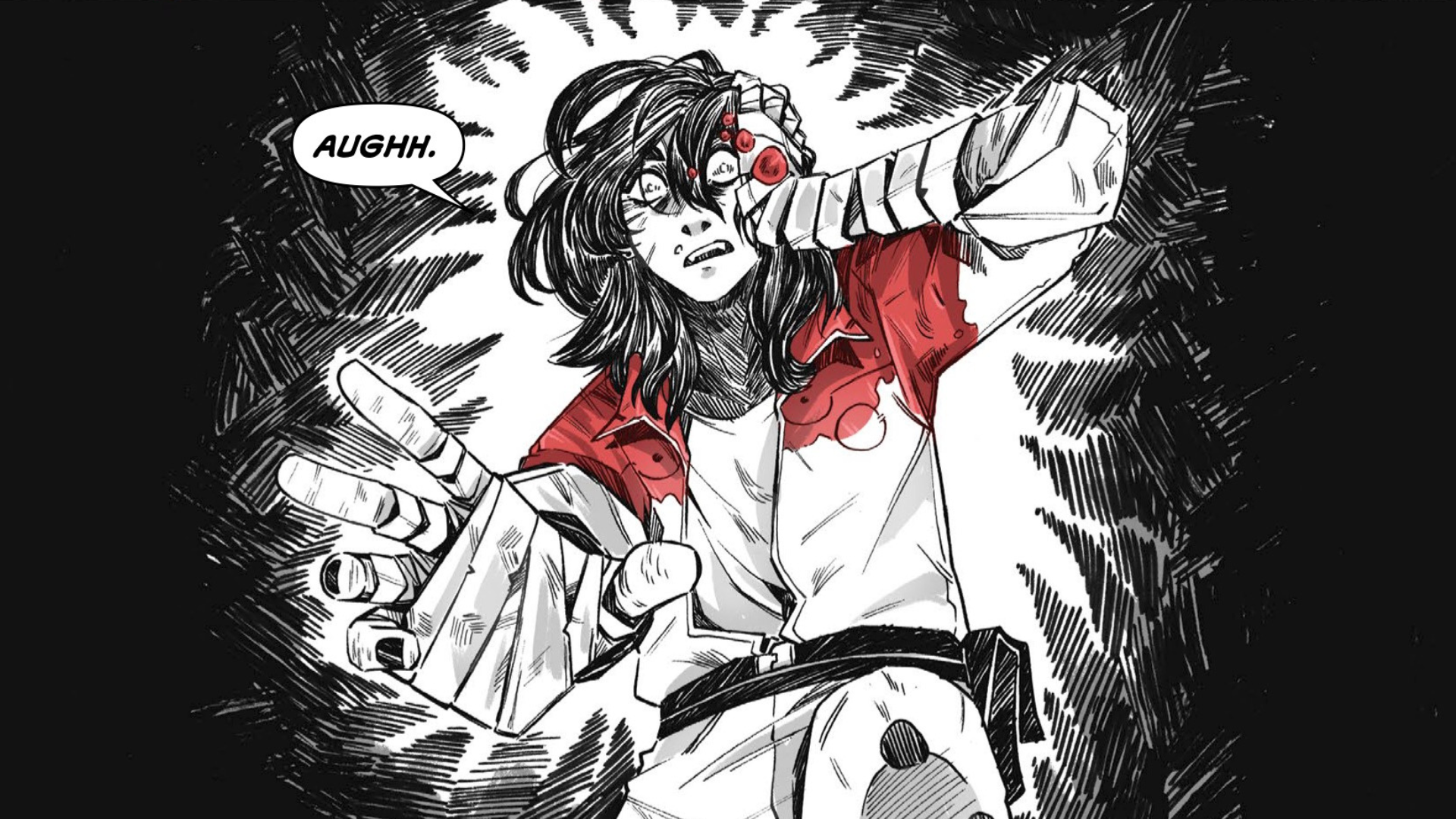
Workplace hazards take on a whole new meaning in It Took Luke: Overworked and Underpaid, a horror graphic novel created by writer Mark Bouchard and artist Bayleigh Underwood, with letters by Micah Meyers. The story follows Sal, an exterminator whose monster-killing job has exhausted them and nearly ruined their life by estranging them from their partner and landing them firmly between a rock and a hard place.
Their goal is to make it through just one more shift... and then their new co-worker gets abducted by the monster they've been sent to kill, and Sal has to fight through post-concussion hallucinations to help their team get through the job without further casualties.
It Took Luke launched on Kickstarter in late 2020 and raised more than $14 thousand from its backers. Now, the book is being re-released as a hardcover from Oni-Lion Forge Publishing Group with a brand new cover by Underwood.
Newsarama chatted with Bouchard and Underwood about their personal fears, their inspirations for It Took Luke, its non-binary protagonist, and how music plays a major role in this gruesome horror story.
Samantha Puc for Newsarama: Mark and Bayleigh, how has the story in It Took Luke changed since you conceived of it?
Mark Bouchard: The initial story seed came from a Pup song called "Kids." I got this idea for a monster who lived in a Honda Civic and had a sword that was like the size of [their car]. They just did that to get enough money to pay child support. And then that turned into what the story actually is. That was the first iteration before I talked to Bayleigh about it, and then we talked, and it changed.
Bayleigh Underwood: I might have given some rough suggestions when it was in the writing phase, but most of my stuff was given in the art phase, like character designs and vibes and monsters.
Get the best comic news, insights, opinions, analysis and more!
Nrama: The book is primarily black and white, but then there are bright red pops anytime there's blood in the frame – was that always the plan?
Bouchard: It was partially an aesthetic choice, and partially it saved time. I really love red, white, and black. I think that's a very strong color combination and I like my wardrobe to reflect that. [The My Chemical Romance album] Three Cheers for Sweet Revenge is the blueprint and they did it and it worked.
Underwood: I prefer working in black and white over color. I don't have a sense for color the way I do black and white, so if I have to do color, I prefer doing mostly black and white with a single color as an accent. That's just the way I prefer working.
Nrama: Even though music is not a direct subject covered in It Took Luke, what are some of the bands or sounds that influenced the book as you were creating it?
Bouchard: I have a whole playlist.
Underwood: The one I think of is the band 8 Graves. I basically listened to all of their music on a big playlist while working on a lot of Luke. It had the right tone and the right vibe for it.
Bouchard: I [make a playlist] for every project, and usually it's just something for me to write to, but for It Took Luke, it's also a soundtrack, so it's like 90 minutes of music. Some of it is from film scores, and then bands that pop up on here are Destroy Boys, The Hotelier, Mannequin Pussy, Black Flag, Poppy, and Cerce, which is a hardcore band from Boston. I think their music is really good for figuring out fight scenes. There's also a lot of music from the Mandy soundtrack, which helped me in the quieter moments.
Nrama: What were some of the most prevalent or important themes you wanted to explore here?
Bouchard: For sure crunch culture and its casualties, the outcomes of grinding yourself into the dirt for an employer that doesn't care about you. That was the big one. And then wanting to see how that played out and what the effect would be on not only the person who's doing that but also the people in their lives.
It ripples through how Sal interacts with Molly and Hussam, [their co-workers], and especially how Sal interacts with Alex, [their ex-partner]. Capitalism being bad was at the forefront of my mind, writing this on my hour-long commute to my 50-hour-a-week office job back in the day.
Nrama: Regarding victims of crunch culture, we don't see very much of Luke, but his name is in the title. Can you speak to me a little bit about that dichotomy?
Bouchard: I'm a big fan of when movies or any piece of media says the title. So a big part of going with this title was saying, "Alright, at some point, somebody is going to say, 'It took Luke.'" When Hussam says it, it's a beat that really makes you pause because of the size of the panel versus the lack of words.
Underwood: It does add a bit to the crunch culture critique, just because that also happens when someone new joins a job where the pace is just ridiculous. I used to work at a job where there was a ridiculous amount of turnaround because people would join and then a week later, they would leave because they couldn't keep up with the pace even after a single week. I think [It Took Luke] works in that way as well. It's a very quick microcosm of the job drying someone up very quickly who wasn't prepared.
Nrama: One of the key moments in It Took Luke is choosing between doing something altruistic and doing something that could potentially get you killed but is ultimately what you were sent to do. How did that component of the storyline develop?
Bouchard: There aren't really any winners at this level of play, in regards to crunch culture and capitalism. I wouldn't even call the boss a winner. I guess it's one way to illustrate that no matter what you think you can do, you can't subvert this system in a meaningful way without destroying it. Even people you think you're helping... It just doesn't allow for any of those concessions.
Nrama: Sal, the protagonist, is non-binary, but never has a panel where they introduce themselves as such. Why did it feel important not to have a declarative, expository moment like that?
Bouchard: I understand those kinds of moments have a big time and a place, but in a story where it's someone working with people they've known aside from this one new, first-day co-worker, there's no logical point [to include that]. I also really dislike those scenes. I think they take you out of [the story] and if we had put something like that in It Took Luke, it would have really infantilized our readers.
This is not the kind of project that I would [do a panel like that], and I just wanted to let Sal live their life in a way that I want to just live my life. I just started school. I don't want to have to send an e-mail to all my professors saying, "These are actually my pronouns." I don't want to make a whole thing about it when this is the baseline level of respect I should already be getting.
I wanted to give a little bit of a reprieve because the whole book is very stressful for Sal. If they get this and that's the one thing they don't have to worry about this whole time, then I did my duty and I'm so sorry to Sal for the rest of it.
Nrama: What would you say are your goals when it comes to telling queer stories in the horror genre?
Bouchard: I had a conversation with Tini Howard a few years ago, and she saw that her books were being left off of queer book lists but they were very overtly queer. She asked one of the editors, "Why are my books not making the cut?" It was because people curating these lists were looking for books that were more wholesome or romantic in tone.
That's kind of when it clicked. I had been on the hunt for more stories that I saw myself represented in, and these wholesome and romantic stories... While I will occasionally go to a Laura Dean Keeps Breaking Up With Me or something like that, that's not where I really live. That's not really what I want to do. That conversation [with Howard] really gave me the confidence to portray queer relationships in the way I wanted, as opposed to just, "Okay, they are going to be gay and happy and nothing bad is going to happen." And that's fine. There are totally escapist stories like that, and we need stuff like that, but that's not what I'm here to do.
Underwood: I want to do stories about queer people and sometimes those stories are sad and sometimes those stories are happy. They're all over the place. I feel like there's a way to do that.
Nrama: Are any of your personal fears present in this book?
Bouchard: I'm very terrified by the ceaseless marching of the capitalist machine. That's very scary to me, especially with regard to COVID. Seeing all these restrictions go when there's been no meaningful progress made makes it very clear to everyone that we are all the feet of the Flintstones and the car is the capitalist machine.
This book is just full of stressful situations that I wouldn't say reflect any of my concrete fears, but it does definitely have the fear of being back at a job that every day grinds you down and you hate it, but you do it because it gets you a paycheck and you can keep up with it.
Or the fear of being stuck in a place like that and having to be like, "Well, I'm going to make this final attempt to set my life straight, and if that doesn't happen, I'm going to go somewhere else and start over." These are not things that are traditionally thought of as hard stuff, but these are the things that scare me.
Underwood: Yeah, that fear of being stuck between a rock and a hard place. Especially being an artist, there are a lot of times when you really feel like you have to get something done with a ridiculous amount of time. I've definitely been there, and it sucks. You end up not having time for people.
Nrama: Were there any creators who inspired you in the making of It Took Luke?
Bouchard: There weren't really any specific creators, but there were some trends. I watched a lot of brutal monster movies – movies that really thin out the cast in a big way, like The Ritual, Alien, The Thing – and comics that do the same, like Maria Llovett's Loud and Stokoe's Aliens: Dead Orbit.
Also on the comics front, I was midway through one of my favorite manga for the first time when I started outlining ITL: Goodnight Punpun. It’s a slice of life, but it’s quite dismal for everyone involved…not in a way that I felt I was being punished though, which is hard to do. It was an energy I definitely wanted to bottle for ITL – I love it, it’s awful. It hurts, but it's so good.
I also did a re-read of some horror comics I considered, and still consider to be quite excellent prior to/while writing, including Bttm Fdrs by Ben Passmore and Ezra Claytan Daniels, Clean Room by Gail Simone, Jonathan Davis-Hunt, Quinton Winter, and Todd Klein, Infidel by Pornsak Pichetshote, Aaron Campbell, José Villarubía, and Jeff Powell, The Dregs by Zac Thompson, Lonnie Nadler, Eric Zawadzki, Dee Cunniffe, and Ryan Ferrier. Also BPRD: Plague of Frogs!
Underwood: I'm sure this will surprise no one, but Kentaro Miura, the creator of Berzerk, was a huge influence on me and my art in general, but also this book specifically. And then the game Bloodborne is big on aesthetics, but also the general vibe.
Nrama: What do you hope readers take away from It Took Luke?
Underwood: Don't push yourself too hard for people who don't care about you, or you and everyone you care about will get hurt. I know there's some muddling in here because Hussam and the others can't lose their jobs, but you're more important than any job.
Bouchard: I think that really sums it up. The people in your life are more important than these jobs. I understand that it's difficult and have been in the situation where you have to do it until you can make an exit, but if this book convinces one person to leave their job that treats them like crap, that would be awesome.
It Took Luke: Overworked and Underpaid will be available October 18. It makes Newsarama's list of 20 graphic novels to read in fall 2022.
And don't miss the best horror comics of all time.
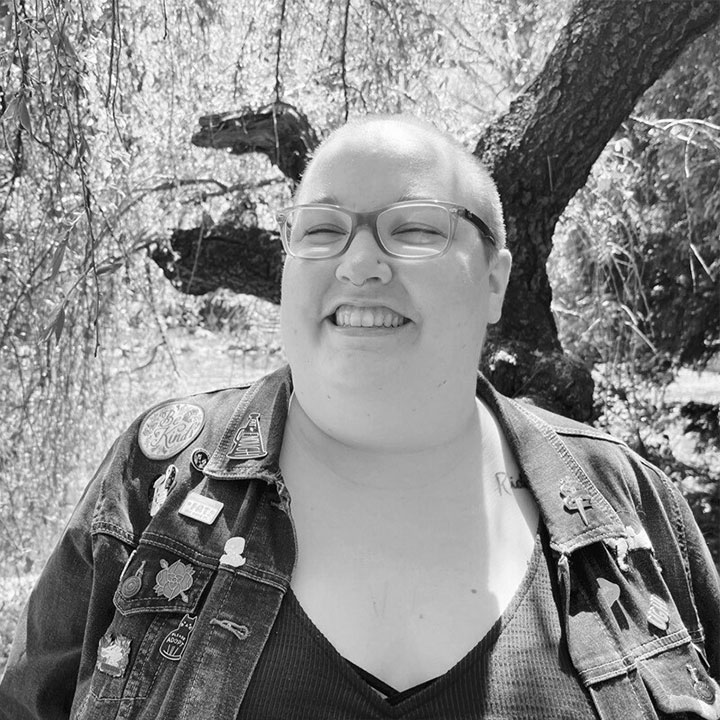
Samantha Puc (she/they) is an editor at Newsarama and an avid comics fan. Their writing has been featured on Refinery29, Bitch Media, them., The Beat, The Mary Sue, and elsewhere. She is currently pursuing a Master of Fine Arts degree in creative nonfiction at The New School.
